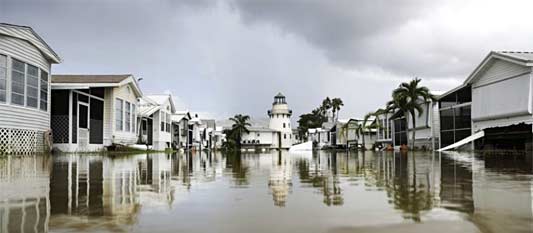Florida's Hard Choices After Mega-Storm
Posted September 19, 2017 09:05 am | Op-Ed
Hurricane Irma rammed home the point that Floridians need leaders to provide more than a mop to deal with the damage and misery these mega-storms bring.
We just got overwhelmed by a natural disaster that showed again how vulnerable we are. Climate change – yes, deniers, it is real – will likely bring more storms the size of Irma, or maybe larger.

Ponder that.
Oh, people will clean up from the most powerful storm to hit Florida in a quarter century. There will be investigations into the nursing home tragedy in Hollywood Hills. Some places might enact tougher building codes and things like that.
The bigger question, though, is whether Tallahassee will finally realize Florida needs some fundamental policy changes.
Take the catastrophic power failures throughout the state, for starters. There is an ongoing power struggle between large power companies and those who advocate for expanded use of solar power.
Solar was helpful during Irma.
In Coral Springs, for instance, where an estimated 300,000 people lost power Inside Climate News reported how that city kept solar-powered traffic lights functioning at 13 major intersections.
There were stories of individuals who used solar to power their homes even in hard-hit places with widespread electrical failures.
The wise thing to do would be to remove the many bureaucratic barriers and surcharges power companies charge homeowners who want to go off the grid.
Floridians want solar energy. They overwhelmingly passed Amendment 4 last year, which gave property tax breaks to homeowners who installed solar panels, with 73 percent of the vote.
This should be a front-burner conversation in Tallahassee.
The state and local communities also could finally find the backbone to curb runaway coastal development. I know – insert laugh track here.
If common sense doesn’t win the argument though, maybe this will. The New York Times recently provided some staggering numbers about both the growth along Florida’s coasts and the cost associated with hurricane damage.
Since 1990, two years before Hurricane Andrew ripped apart large portions of South Florida, the state has added about 6 million people. That growth isn’t slowing.
The Times cited a 2016 Congressional Budget Office report that estimated hurricane damage costs $24 billion annually, a number that is expected to increase dramatically.
Ashley Dawson, a professor at the Princeton Environmental Institute, pointed out another potential danger in an op-ed that appeared in the Times a few days before Irma hit.
“ … there’s the threat of a storm-caused nuclear meltdown. The Turkey Point nuclear power station sits on an exposed island in Biscayne Bay, about 25 miles south of Miami,” she wrote.
“Built in the early 1970s, the aging plant depends on similar vulnerable backup systems to prevent a meltdown as those of Japan’s Fukushima plant, which is still leaking radiation.”
Washington needs to get in the game too. President Trump’s proposed budget called for a 16 percent cut at NOAA, an agency that proved to be kind of valuable in providing early and detailed warnings about Irma and other storms.
Add it up.
Millions of displaced residents. Billions in damages. Florida’s emergency response both before and after the storm was exemplary, but people deserve more to help mitigate these storms long before they arrive.
We can’t stop them, but better policies going forward might help limit the damage. That will require some hard decisions in Tallahassee starting now. Think they’re up to it?
---------------
Joe Henderson had a 45-year career in newspapers, including the last nearly 42 years at The Tampa Tribune. Mr. Henderson has numerous local, state and national writing awards. He has been married to his wife, Elaine, for nearly 35 years, and has two grown sons. Column courtesy of Florida Politics.
This piece was reprinted by the Columbia County Observer with permission or license.

 By Joe Henderson
By Joe Henderson